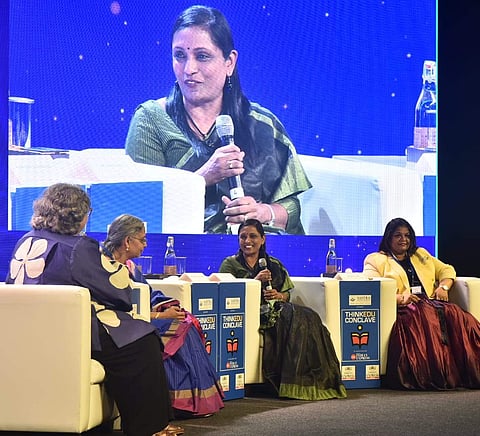

A panel of accomplished women in the fields of science, technology, engineering, and mathematics (STEM) emphasised the need for resilience and determination among women pursuing careers in these domains at the 13th ThinkEdu Conclave, presented by SASTRA University, held in Chennai on Thursday.
The insightful discussion, chaired by senior journalist Kaveree Bamzai, took place on the second day of the conclave and featured eminent figures such as Annapurni Subramaniam, director of the Indian Institute of Astrophysics, Priya Abraham, professor of clinical virology at CMC Vellore, and Srimathy Kesan, founder and chief executive officer of Space Kidz India.
Reflecting on their journeys, the panelists shared valuable insights into the challenges and triumphs they encountered, inspiring aspiring women in STEM fields.
Abraham, renowned for her pivotal role in developing Covaxin during the pandemic, expressed mixed emotions while discussing the movie “Vaccine War,” highlighting the unsung heroes often left unnoticed.
“In the realms of space science and biology, the margin for error is exceedingly narrow. Announcing the presence of a virus demands a meticulous approach and an abundance of caution. When conveying to the ministry that our country had encountered the virus, I ensured two labs conducted simultaneous tests on identical samples. This precautionary measure was imperative to avoid any inadvertent fear-mongering,” she said.
Subramaniam, delving into the allure of space sciences, remarked on the fascination of exploring the unknown. She emphasised the importance of exposing children to the wonders of the night sky and called for initiatives to reduce light pollution, enabling everyone to appreciate the beauty of stars.
“We must endeavor to make the night sky, adorned with a multitude of stars, visible to all—a sight currently elusive to many. Initiatives are required to establish spaces granting universal access to the night sky. Simultaneously, we need to address the issue of energy wastage by curbing the unnecessary illumination in areas where it serves no purpose,” she said.
Kesan drew attention to the lack of media recognition for women achievers in STEM and its impact on young girls’ awareness of role models.
“Tessy Thomas, revered as ‘Agni Putri’ for her leadership in the Agni mission, remains unfortunately unfamiliar to many. It’s disheartening that despite the achievements of young girls in our Young Scientist India competition, some parents approach me with reservations about their daughters pursuing science. This reluctance stems from cultural norms in certain communities, where girls traditionally marry soon after completing Class 12,” she said adding that the concern often revolves around perceived safety issues, adding an extra layer of complexity to the challenge of promoting STEM education among young girls.
Addressing the pivotal role of mentors, Abraham stressed the significance of having mentors who have made significant contributions to the field.
“In assuming leadership positions, the responsibility lies upon us to exemplify empathy and extend necessary support. A true leader ought to be both available and approachable, fostering an environment of collaboration and guidance for those under their purview,” she said.
Subramaniam shared her journey, recounting the challenges of being unrecognised despite academic success. She encouraged aspiring scientists to choose their battles wisely, preserving energy and time for their ultimate goals.
“The prospect of passively staying at home after completing my master’s was both unacceptable and frightening. I summoned all my strength to actively pursue a research position,” she recounted. She further shared an amusing anecdote when her mother spontaneously suggested studying the sun instead of the stars, expressing concern about nighttime work.
